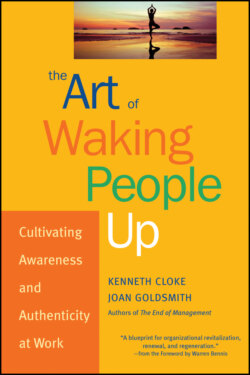Читать книгу The Art of Waking People Up - Kenneth Cloke - Страница 31
Why Organizations Create Roles
ОглавлениеTraditional organizations use roles to define and reinforce rigid hierarchies of power. They do little to support people in changing or acting in ways that are authentic, honest, immediate, collaborative, and democratic, because to do so would invite a rearrangement of power relationships. Hierarchical, bureaucratic, and authoritarian organizational models permit—and in some cases actively encourage—role rigidity and hypocrisy. These organizations are unwilling to admit or examine their faults publicly. They discourage honest communication, suppress creativity, and undermine teamwork and self-confidence. In the process they put people to sleep.
In the absence of honest feedback and continuous scrutiny, these organizations desperately seek to defend and perpetuate themselves, causing them to undermine the values they publicly proclaim. They espouse creativity yet reward bureaucracy, conservatism, and defensiveness. They urge risk taking but celebrate only those who increase or preserve their financial bottom line. They call for change yet reward caution, stasis, and denial. They advocate equality but radically limit the possibilities for personal and organizational growth for those at the bottom. Is it any wonder that people fall asleep rather than wake up and risk their livelihood championing values that, while publicly proclaimed, are privately punished?
Where are the great examples of hierarchical organizations exercising courageous moral leadership? Where are the profound apologies, the honest confessions, the open admissions of error? When did a corporate CEO or government official last publicly admit wrongdoing without being forced to do so by an angry citizenry, a judge, or a prying press? How often are corporations balanced and truthful in their advertising, politicians in discussing the merits of opposing candidates, or CEOs in responding to allegations of financial or social wrongdoing? Examples of these dishonesties can be found in the newspapers every day and are apparent to everyone who is willing to acknowledge that abuses inevitably flow from the inflexibility and concentration of organizational power. If we want people to wake up and be honest with themselves, we need to honestly reveal what stands in their way within organizational life, act to overcome it, and model the behaviors we publicly advocate, starting with ourselves.
Every day, employees are punished for giving or receiving honest feedback to those higher in rank than themselves. Or their criticisms are passed through a maze of bureaucratic filters and rationalizations that diminish their effectiveness. As a result, many learn the virtues of silence and go to sleep.
Yet organizations that resist honest feedback or penalize employees for delivering it limit their own capacity to adapt, learn, and evolve. They reduce the desire of employees to expand their motivation, increase their skills, and make important contributions to their organizations. They shortchange themselves and those who rely on them.
Employees are then forced to choose among upsetting, ultimately ineffective strategies and to decide whether to fight back, quit, avoid, or accommodate and do what they are told. Few recognize that there is another choice: they can cultivate awareness and authenticity in themselves and others and work strategically to build respect for these qualities within their organizations.
